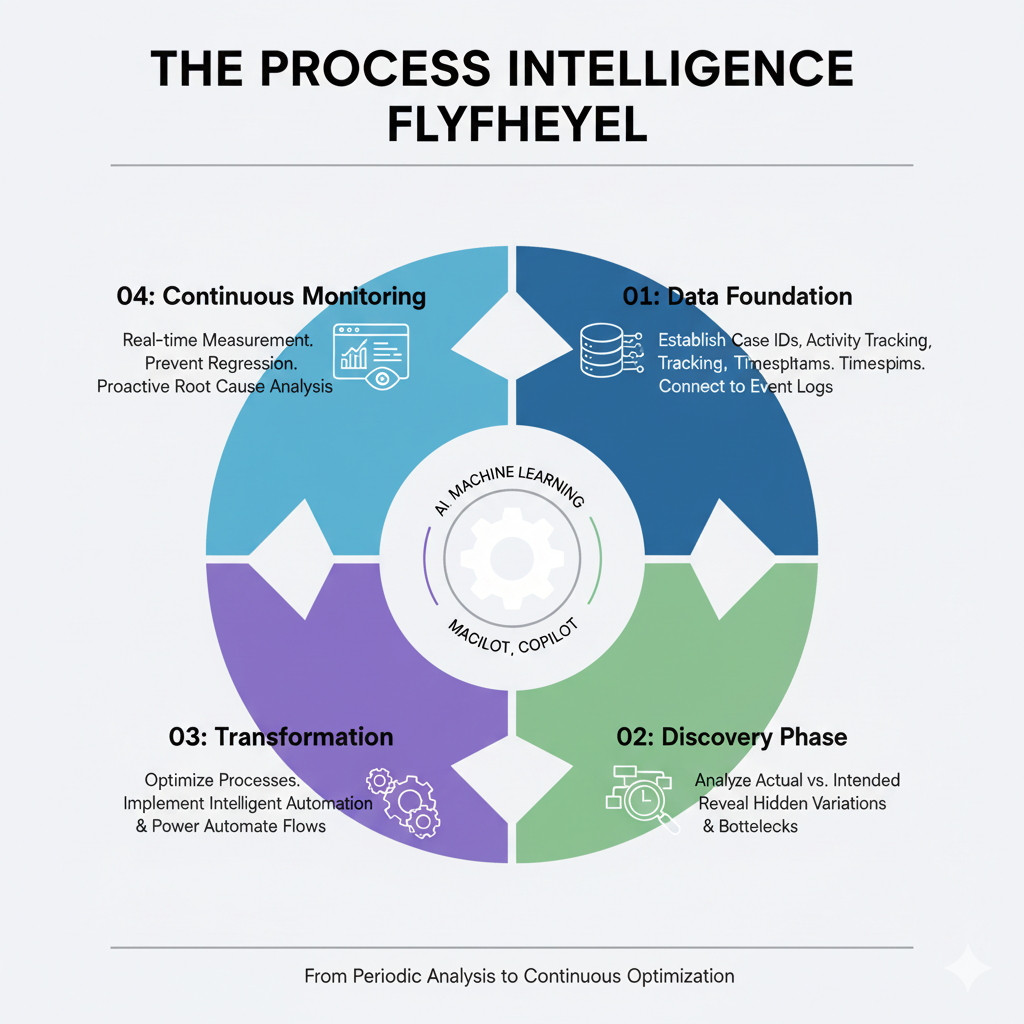The Death of Low-Code: The Rise of Intelligence-First Development (PPCC Keynote)

The Death of Traditional Low-Code and the Birth of Intelligence-First Development
We're witnessing a once-in-a-generation transformation that's fundamentally reshaping enterprise automation. The traditional boundaries between citizen developers and professional developers are dissolving, and what we once called "low-code" is being reborn with artificial intelligence woven into its very core.
The statistics speak volumes: over 56 million monthly active users are already leveraging platforms like Microsoft's Power Platform, and organizations worldwide are experiencing dramatic productivity gains. One compelling example showed Copilot returning over 600 hours to staff within just four to six months, while another organization deployed their first Service Desk AI agent in under three months.
This isn't just about faster development—it's about fundamentally reimagining how businesses approach automation, application development, and operational efficiency.
The Multi-Agent Revolution: From Months to Days
Specialized AI Agents Transform Development
Modern enterprise automation now deploys specialized AI agents that work collaboratively to deliver comprehensive solutions:
- Requirements Agents analyze business problems and structure user needs
- Data Agents automatically build sophisticated relational data models
- Code Agents author multi-file system components and full applications
- Solution Agents orchestrate the entire development process
Consider State Farm's training management system implementation: what traditionally required weeks of planning, coding, and testing was accomplished in minutes through AI agent collaboration. The Requirements Agent structured the business problem, the Data Agent constructed a comprehensive data model in Dataverse understanding complex relationships, and the Code Agent built the application infrastructure—all happening in real-time.
Real-World Impact: Nationwide's Claims Processing Revolution
Nationwide, America's largest pet insurance provider, processes over 4.7 million claims annually using Power Platform technologies. Their innovative AI-powered claims flow demonstrates how intelligent document processing can transform traditional, labor-intensive workflows.
The system performs three critical functions simultaneously:
- Intelligent extraction from veterinary reports using natural language processing
- Visual analysis of evidence photographs with contextual understanding
- Cross-referencing extracted data with existing insurance policies for coverage determinations
Where traditional systems required multiple machine learning models, extensive OCR processing, and weeks of training, modern AI prompts accomplish the same tasks with just a few sentences of instruction—correctly identifying pets, matching policy information, and determining coverage eligibility within seconds.
Breaking Down Barriers: Democratizing Enterprise Development
Conversational Development in Microsoft 365
Microsoft's integration of Power Platform capabilities directly into Microsoft 365 Copilot represents a strategic expansion of who can build AI-powered solutions. The new Workflows agent allows users to build Power Automate flows using natural language conversation, maintaining all backend benefits including governance, security, and environment management.
For professional services firms like PwC, this means risk compliance teams can now create sophisticated automations simply by describing their needs: "When a regulatory notice email arrives, summarize the key components, and post it into our watch group chat." The agent immediately constructs a comprehensive solution with intelligent triggers, AI-powered content processing, and team communication integration.
App Builder: Developer-Like Capabilities for Business Users
The App Builder agent enables organizations to create sophisticated applications through natural language interactions. Requesting "Make me an application to handle all these incoming questions, make it a dashboard, make it look nice" results in a fully functional application featuring:
- Visual analytics with interactive graphs and charts
- Streamlined question management systems
- Document integration capabilities
- Meeting notes incorporation
The agent creates product requirement documents, manages task lists, and uses actual developer workflows—essentially mimicking experienced developers while remaining accessible to domain experts.
The Governance Advantage: Enterprise-Grade Intelligence
Balancing Innovation with Security
Modern AI-powered applications must balance innovation with security and compliance. The latest developments ensure that even the most advanced AI capabilities remain fully governed and auditable. IT administrators maintain complete visibility and control over AI assets while enabling makers to innovate freely within established guardrails.
This governance framework extends to all AI interactions, from data entry agents that understand Microsoft 365 contexts to exploration agents that visualize complex datasets. Organizations can embrace AI acceleration without compromising security or compliance requirements.
Quality Assurance Through Agent Evaluation
While building AI agents has become dramatically easier, ensuring reliable, high-quality results remains challenging. New evaluation capabilities in Copilot Studio allow makers to create comprehensive test sets and define quality metrics for agent responses.
Makers can manually create test questions or use AI to generate comprehensive test scenarios, then define quality criteria ranging from general quality scores to specific requirements. This evaluation capability addresses the critical gap between building agents and deploying reliable, production-ready AI systems.
Industry Transformation: From Formula 1 to Professional Services
High-Performance Environments
Alpine's Formula 1 partnership with Microsoft exemplifies how AI automation performs in high-stakes environments where milliseconds matter. The team leverages Power Platform to:
- Accelerate part delivery to cars
- Process terabytes of aerodynamic data every minute
- Make real-time performance decisions
- Gain competitive advantages through data-driven insights
This demonstrates that AI automation tools can perform at the highest levels of competition, where the margin for error is virtually zero.
Professional Services Revolution
Professional services firms face constant regulatory updates, policy changes, and compliance requirements. AI agents are transforming how these organizations manage information scattered across emails, knowledge bases, and team communications—eliminating bottlenecks and reducing compliance risks.
The Future of Intelligent Applications
Beyond Chat Windows: Invisible AI Integration
The most effective AI integration doesn't announce itself through obvious bot interactions. Instead, it manifests as:
- Seamless data entry assistance
- Intelligent visualization suggestions
- Contextual insights that appear exactly when needed
- Forms that auto-populate from email content
- Charts that generate based on natural language requests
Generative Pages: Building with Intent
The introduction of Generative Pages represents a fundamental shift in application development methodology. Developers can now build with intent rather than implementation, describing desired outcomes rather than coding specific functions. This maintains enterprise-grade capabilities while dramatically reducing technical barriers to entry.
Strategic Implementation for Businesses
Getting Started with AI-Powered Automation
Organizations ready to embrace AI-powered automation should focus on:
- Identifying power users who understand business processes but may lack traditional technical skills
- Starting with high-impact, low-complexity scenarios involving repetitive tasks or data summarization
- Building internal communities where successful automation examples can be shared
- Leveraging existing technology investments through enhanced agent capabilities
- Creating governance frameworks that ensure secure, compliant automation
The Community Advantage
The Power Platform community's greatest strength lies in its diversity—legal professionals becoming automation experts, traditional IT boundaries dissolving into collaborative innovation. This culture of experimentation and learning has been central to the platform's evolution from a small idea to an ecosystem serving millions of users.
Conclusion: Embracing the Automation Revolution
The convergence of AI agents, intelligent automation, and enterprise-grade governance represents a pivotal moment in business technology. Organizations that embrace these capabilities now will gain significant competitive advantages through faster development cycles, more responsive applications, and enhanced operational efficiency.
The question isn't whether AI agents will transform business operations—it's how quickly organizations can adapt to leverage these powerful new capabilities. With over 200,000 organizations already using platforms like Copilot Studio to create agents, the automation revolution is well underway.
Success will be measured not by technical depth in specific tools, but by the ability to orchestrate intelligent systems that solve real-world problems. The makers of tomorrow will be those who embrace AI as a creative partner and continue to push the boundaries of what's possible in the age of abundant intelligence.
The tools are available today—the opportunity is yours to seize. As we continue to experiment, learn, and grow together, we're not just building applications—we're building the future of work itself.
Ready to transform your business with AI-powered automation? Contact FlowDevs.io to discover how intelligent agents can revolutionize your enterprise operations and drive unprecedented efficiency gains
The Death of Traditional Low-Code and the Birth of Intelligence-First Development
We're witnessing a once-in-a-generation transformation that's fundamentally reshaping enterprise automation. The traditional boundaries between citizen developers and professional developers are dissolving, and what we once called "low-code" is being reborn with artificial intelligence woven into its very core.
The statistics speak volumes: over 56 million monthly active users are already leveraging platforms like Microsoft's Power Platform, and organizations worldwide are experiencing dramatic productivity gains. One compelling example showed Copilot returning over 600 hours to staff within just four to six months, while another organization deployed their first Service Desk AI agent in under three months.
This isn't just about faster development—it's about fundamentally reimagining how businesses approach automation, application development, and operational efficiency.
The Multi-Agent Revolution: From Months to Days
Specialized AI Agents Transform Development
Modern enterprise automation now deploys specialized AI agents that work collaboratively to deliver comprehensive solutions:
- Requirements Agents analyze business problems and structure user needs
- Data Agents automatically build sophisticated relational data models
- Code Agents author multi-file system components and full applications
- Solution Agents orchestrate the entire development process
Consider State Farm's training management system implementation: what traditionally required weeks of planning, coding, and testing was accomplished in minutes through AI agent collaboration. The Requirements Agent structured the business problem, the Data Agent constructed a comprehensive data model in Dataverse understanding complex relationships, and the Code Agent built the application infrastructure—all happening in real-time.
Real-World Impact: Nationwide's Claims Processing Revolution
Nationwide, America's largest pet insurance provider, processes over 4.7 million claims annually using Power Platform technologies. Their innovative AI-powered claims flow demonstrates how intelligent document processing can transform traditional, labor-intensive workflows.
The system performs three critical functions simultaneously:
- Intelligent extraction from veterinary reports using natural language processing
- Visual analysis of evidence photographs with contextual understanding
- Cross-referencing extracted data with existing insurance policies for coverage determinations
Where traditional systems required multiple machine learning models, extensive OCR processing, and weeks of training, modern AI prompts accomplish the same tasks with just a few sentences of instruction—correctly identifying pets, matching policy information, and determining coverage eligibility within seconds.
Breaking Down Barriers: Democratizing Enterprise Development
Conversational Development in Microsoft 365
Microsoft's integration of Power Platform capabilities directly into Microsoft 365 Copilot represents a strategic expansion of who can build AI-powered solutions. The new Workflows agent allows users to build Power Automate flows using natural language conversation, maintaining all backend benefits including governance, security, and environment management.
For professional services firms like PwC, this means risk compliance teams can now create sophisticated automations simply by describing their needs: "When a regulatory notice email arrives, summarize the key components, and post it into our watch group chat." The agent immediately constructs a comprehensive solution with intelligent triggers, AI-powered content processing, and team communication integration.
App Builder: Developer-Like Capabilities for Business Users
The App Builder agent enables organizations to create sophisticated applications through natural language interactions. Requesting "Make me an application to handle all these incoming questions, make it a dashboard, make it look nice" results in a fully functional application featuring:
- Visual analytics with interactive graphs and charts
- Streamlined question management systems
- Document integration capabilities
- Meeting notes incorporation
The agent creates product requirement documents, manages task lists, and uses actual developer workflows—essentially mimicking experienced developers while remaining accessible to domain experts.
The Governance Advantage: Enterprise-Grade Intelligence
Balancing Innovation with Security
Modern AI-powered applications must balance innovation with security and compliance. The latest developments ensure that even the most advanced AI capabilities remain fully governed and auditable. IT administrators maintain complete visibility and control over AI assets while enabling makers to innovate freely within established guardrails.
This governance framework extends to all AI interactions, from data entry agents that understand Microsoft 365 contexts to exploration agents that visualize complex datasets. Organizations can embrace AI acceleration without compromising security or compliance requirements.
Quality Assurance Through Agent Evaluation
While building AI agents has become dramatically easier, ensuring reliable, high-quality results remains challenging. New evaluation capabilities in Copilot Studio allow makers to create comprehensive test sets and define quality metrics for agent responses.
Makers can manually create test questions or use AI to generate comprehensive test scenarios, then define quality criteria ranging from general quality scores to specific requirements. This evaluation capability addresses the critical gap between building agents and deploying reliable, production-ready AI systems.
Industry Transformation: From Formula 1 to Professional Services
High-Performance Environments
Alpine's Formula 1 partnership with Microsoft exemplifies how AI automation performs in high-stakes environments where milliseconds matter. The team leverages Power Platform to:
- Accelerate part delivery to cars
- Process terabytes of aerodynamic data every minute
- Make real-time performance decisions
- Gain competitive advantages through data-driven insights
This demonstrates that AI automation tools can perform at the highest levels of competition, where the margin for error is virtually zero.
Professional Services Revolution
Professional services firms face constant regulatory updates, policy changes, and compliance requirements. AI agents are transforming how these organizations manage information scattered across emails, knowledge bases, and team communications—eliminating bottlenecks and reducing compliance risks.
The Future of Intelligent Applications
Beyond Chat Windows: Invisible AI Integration
The most effective AI integration doesn't announce itself through obvious bot interactions. Instead, it manifests as:
- Seamless data entry assistance
- Intelligent visualization suggestions
- Contextual insights that appear exactly when needed
- Forms that auto-populate from email content
- Charts that generate based on natural language requests
Generative Pages: Building with Intent
The introduction of Generative Pages represents a fundamental shift in application development methodology. Developers can now build with intent rather than implementation, describing desired outcomes rather than coding specific functions. This maintains enterprise-grade capabilities while dramatically reducing technical barriers to entry.
Strategic Implementation for Businesses
Getting Started with AI-Powered Automation
Organizations ready to embrace AI-powered automation should focus on:
- Identifying power users who understand business processes but may lack traditional technical skills
- Starting with high-impact, low-complexity scenarios involving repetitive tasks or data summarization
- Building internal communities where successful automation examples can be shared
- Leveraging existing technology investments through enhanced agent capabilities
- Creating governance frameworks that ensure secure, compliant automation
The Community Advantage
The Power Platform community's greatest strength lies in its diversity—legal professionals becoming automation experts, traditional IT boundaries dissolving into collaborative innovation. This culture of experimentation and learning has been central to the platform's evolution from a small idea to an ecosystem serving millions of users.
Conclusion: Embracing the Automation Revolution
The convergence of AI agents, intelligent automation, and enterprise-grade governance represents a pivotal moment in business technology. Organizations that embrace these capabilities now will gain significant competitive advantages through faster development cycles, more responsive applications, and enhanced operational efficiency.
The question isn't whether AI agents will transform business operations—it's how quickly organizations can adapt to leverage these powerful new capabilities. With over 200,000 organizations already using platforms like Copilot Studio to create agents, the automation revolution is well underway.
Success will be measured not by technical depth in specific tools, but by the ability to orchestrate intelligent systems that solve real-world problems. The makers of tomorrow will be those who embrace AI as a creative partner and continue to push the boundaries of what's possible in the age of abundant intelligence.
The tools are available today—the opportunity is yours to seize. As we continue to experiment, learn, and grow together, we're not just building applications—we're building the future of work itself.
Ready to transform your business with AI-powered automation? Contact FlowDevs.io to discover how intelligent agents can revolutionize your enterprise operations and drive unprecedented efficiency gains
Related Blog Posts

PPCC Keynote: Microsoft Fabric: The Game-Changing Platform Transforming Enterprise Data Culture for the AI Era

PPCC: The Process Intelligence Revolution: How Modern Enterprises Are Transforming Operations with AI-Powered Process Mining


.jpg)